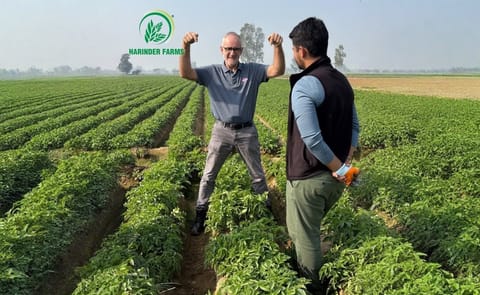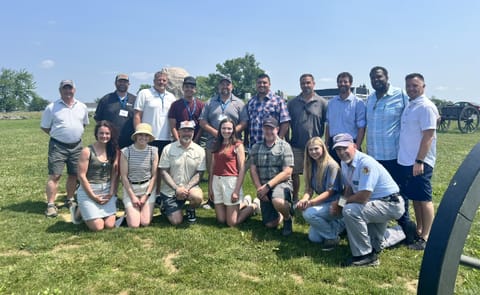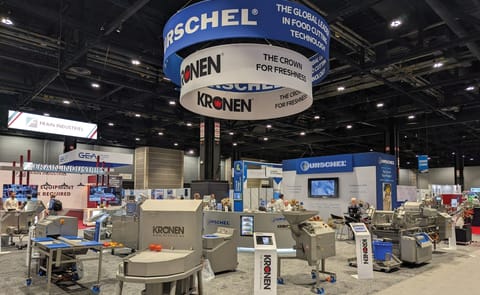Smart Big Bags for seed potatoes keep track of temperature during transport
Smart Big Bags for seed potatoes keep track of temperature during transport

With the pilot, 'smart big bags' HZPC uses the internet of things to share knowledge and get a better grip on the delivery process of seed potatoes.
Between December and April 1100 big bags will be provided with an intelligent chip.
Customers can hold their smartphone against the chip when they receive it, so they can easily download the cultivation advice that goes with the sold variety. Moreover, 100 of these chips are equipped with a microsensor that registers temperatures during transport.
Insight into transport conditions
Hans Langedijk, Marketing Specialist:
Hans Langedijk:
According to developer Niels Postma of Tapp.online, the possibilities of the smart chip are endless. He succeeded in integrating the existing Near Field Communication (NFC) technology - which is used for contactless payments - into paper.
This makes it relatively easy to bring technical intelligence to places and products where the Internet of Things was not previously available.
Niels Postma of Tapp.online:
The innovative paper chips fromTapp.online function completely without power supply. The latest chips with added microsensor do have minuscule printed batteries. These batteries occasionally generate small pulses of power.
Niels Postma:
Hans Langedijk:
The first smart big bags are already on their way and delivery will continue until April 2021. This will be followed by an evaluation of the results.
Hans Langedijk:
Between December and April 1100 big bags will be provided with an intelligent chip.
Customers can hold their smartphone against the chip when they receive it, so they can easily download the cultivation advice that goes with the sold variety. Moreover, 100 of these chips are equipped with a microsensor that registers temperatures during transport.
Insight into transport conditions
Hans Langedijk, Marketing Specialist:
“The pilot is a continuation of a trial with 80 smart big bags that were delivered to customers in Spain last season.”New in the pilot is that a part of the chips is provided with a temperature sensor.
“That turned out to be successful, which is why we are now expanding the sca.”
“In order to find out whether the downloading of variety information is handled equally well everywhere, this time we are sending 1100 smart big bags to Bulgaria, France, Italy, Portugal, Serbia, Spain, and Turkey. When reading out the chip via their own smartphone, each buyer receives our cultivation advice directly in their own language. In this way, we make sharing information as easy as possible.”
Hans Langedijk:
“We wondered whether the smart big bags could also be used to measure transport conditions because that information could help us better identify any complaints about the seed potatoes later on. It can take weeks for parties to transport to ware growers.”Internet of things
“With sometimes transshipment between truck, train, and boat, while temperature fluctuations do not improve the quality of the seed potatoes. That is why we would like to have more insight into the conditions during shipment. In this pilot, we focus only on temperature, but for the future, we are also thinking of sensors for measuring humidity, CO2, and shock intensity.”
According to developer Niels Postma of Tapp.online, the possibilities of the smart chip are endless. He succeeded in integrating the existing Near Field Communication (NFC) technology - which is used for contactless payments - into paper.
This makes it relatively easy to bring technical intelligence to places and products where the Internet of Things was not previously available.
Niels Postma of Tapp.online:
“The use is very accessible.”Printed batteries
“Anyone with a smartphone can activate the magnetic field of the chip and therefore download information. Anywhere in the world. And there's more to gain from this technology. Over the past few months, we have succeeded in integrating a microsensor into the chip to monitor the transport temperature. If its application works out well in HZPC's pilot, we can add other functions as well.”
The innovative paper chips fromTapp.online function completely without power supply. The latest chips with added microsensor do have minuscule printed batteries. These batteries occasionally generate small pulses of power.
Niels Postma:
“The temperature is measured and stored according to a certain interval.”Focus on new varieties
“We're going to visualize the data we generate with this. Via a digital map, we can see where the big bags are located, what the temperature fluctuations are, and whether customers can read out the cultivation advices with their smartphone after receiving them.”
“For HZPC it is important to have a good view on this, because the better customers are informed about the relevant variety, the greater the chance that they carefully handle the seed potatoes. In this way they benefit the most of their HZPC variety.”
Hans Langedijk:
“We use the smart big bags in this pilot mainly with our new varieties.”Grow step by step
“If growers are still unfamiliar with a seed potato variety, they will download the variety and cultivation information sooner and the willingness to learn is more likely.”
“Moreover, especially with young varieties, it is important to closely monitor the entire process - including factors such as transport conditions - so that we can better identify any bottlenecks in practice. The commitment of our sales managers and distributors in that process is essential.”
“They are therefore closely involved in this pilot and stimulate local customers to read out the smart big bags upon arrival. The first trial in Spain went well and we are all curious to see how the pilot will work out on a larger scale.”
The first smart big bags are already on their way and delivery will continue until April 2021. This will be followed by an evaluation of the results.
Hans Langedijk:
“If this pilot confirms our positive expectations, we hope to gradually broaden the possibilities of the Internet of Things in our delivery process. Whether or not we will integrate smart chips as standard in the future will depend in part on the costs, which can go up with tens of thousands of big bags every year.”
“But if this innovation catches on more widely in the market, the price will drop automatically. In the meantime, we are investing in the pilot because we are keen to share knowledge and hope to gain more insight into transport conditions.”
Like to receive news like this by email? Join and Subscribe!
Get the latest potato industry news straight to your WhatsApp. Join the PotatoPro WhatsApp Community!
Uitgelichte Bedrijven
Sponsored Content
Sponsored Content
Sponsored Content
Sponsored Content









